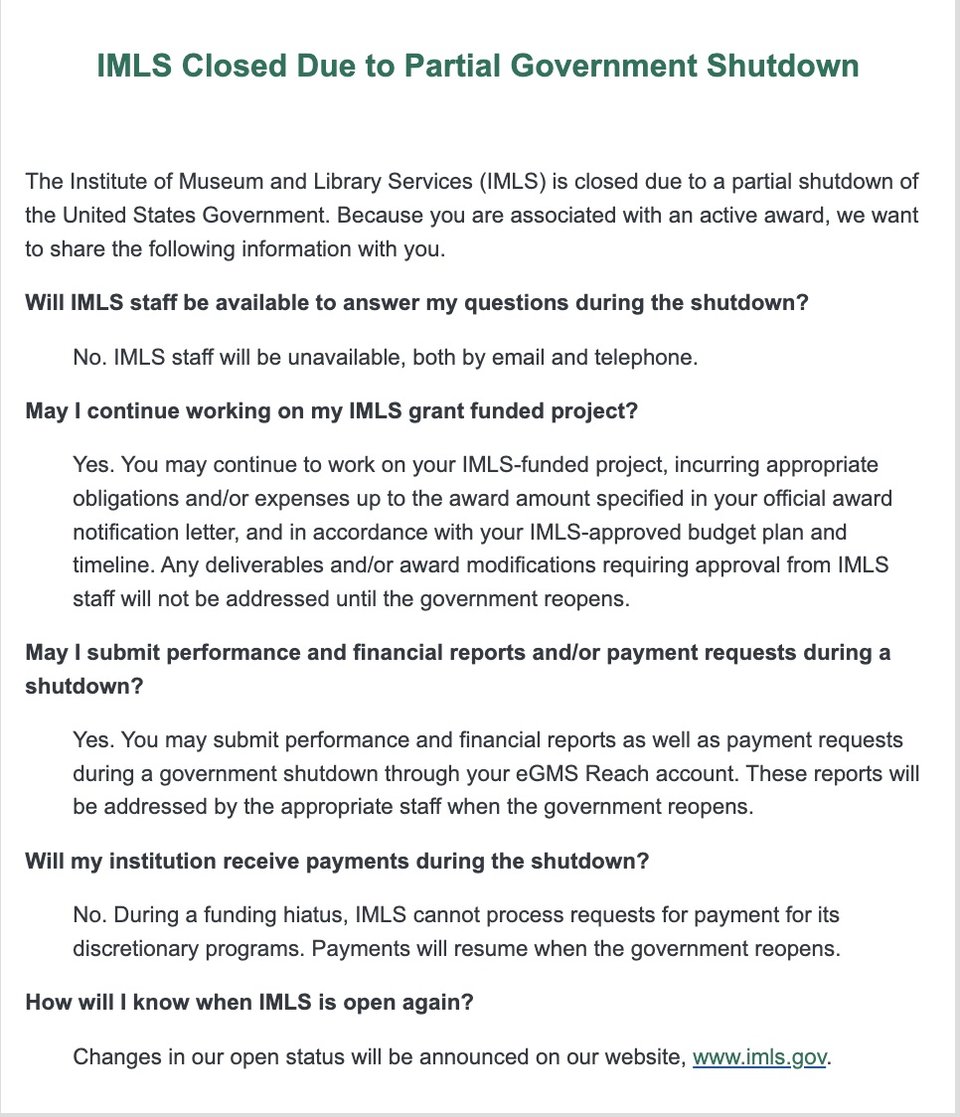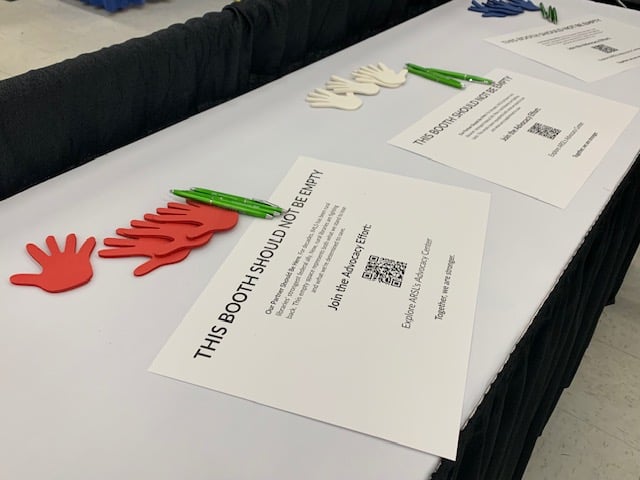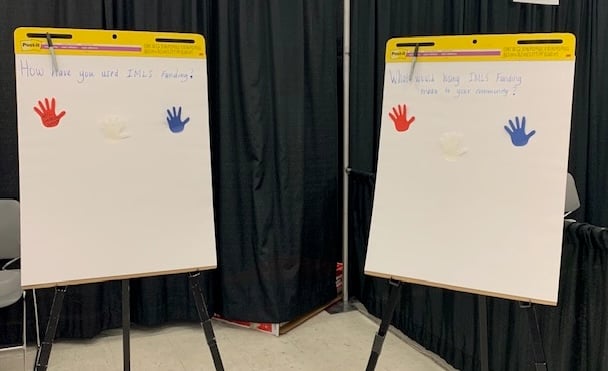The Current State of the Institute of Museum and Library Services (October 2025 Edition)
Grant money that should be going to library projects is going to state-sponsored propaganda, among other IMLS updates.
The Institute of Museum and Library Services (IMLS) took a direct hit from the Trump administration in March. This included a gutting of the institution; repurposing of the IMLS as a propaganda center; two lawsuits brought against the administration for that gutting (Rhode Island vs. Trump and ALA vs. Sonderling); a plan by Trump to sunset the entire agency in the Fiscal Year 2026 budget (FY 26 budget); the rollout of propaganda trucks for America’s 250th birthday; and more. I’ve kept a lengthy document of every recorded move, as well as the impact felt by state and local level libraries.
Plenty has been happening at the IMLS in these last few weeks. Among the highlights–err, lowlights–are a further winnowing of grants available to libraries and library workers, devastating state-level service impacts due to a lack of funds provided by the IMLS, and more.
The IMLS Is Closed During the Government Shutdown
Beginning with what might be the header-level update: thanks to the Republican government’s inability to do their job, there is currently no FY 2026 budget. The government shut down as of midnight on October 1, and the impact is national.
Trump’s version of the budget shuttered the IMLS all together; however, both the House and Senate elected to put funds back into the IMLS in their markups of the bill. What the final results will be is unclear. As of writing, the IMLS is currently closed alongside numerous other government agencies.

You can read the entire plan for the IMLS’s closure during the federal shutdown here. One staff member will not be furloughed.
What results from this shut down will likely play a role in whatever happens to the future of the agency. Even though the IMLS closure isn’t due to the FY 2026 budget cutting the entire agency down, this is a test case for Trump to argue for its sunsetting.
Where Did The Already-Allocated IMLS Grant Money Go?
In the days before the government shut down, though, folks who applied for IMLS grants began to get word about their acceptances or rejections. Some of the applicants had been waiting since the institution’s takeover by the Trump administration. These grants were from pre-allocated money coming from the Fiscal Year 2025 budget.
Two grants of interest are the Laura Bush 21st Century Librarian grant (LB 21) and the National Leadership Grants for Libraries (NLG). These are different from the Grants to States, which help fund library programs and projects by funneling federal dollars to state libraries. The LB and NLG grants are directed to the individuals or institutions themselves, rather than through the state libraries of recipients’ respective states.
Several librarians reached out to me with information about their applications. All had their applications rejected because there was a minimal amount of funding available. That minimal amount wasn’t about the cuts for the FY 2026 budget, though. Recall, this funding was from the prior year. The minimal amount was because that money simply disappeared (more on that in a second).
Here’s what applicants who didn’t receive a LB 21 grant got in their inboxes:

IMLS had only about $4.7 million available for the LB 21 grants, so most applicants did not receive funding. However, per budget tables on the IMLS website, the number reported here is incorrect. It should be $8 million.
For the NLG, the news was even worse. Only eight projects were funded, with only four percent of applicants even being invited to submit a full application. It was anticipated about 60% of those projects would be funded pre-Trump dismantling. Per the budget tables on the IMLS website, the NLG had roughly $13 million allocated for Fiscal Year 2025.
So where did all of the money go? Why didn’t more applications get some kind of disbursement from the IMLS? Beyond the obvious that all grants were target of Trump cuts as part of the agency’s gutting, the bigger answer is worse.
That money was spent on propaganda projects like the above-linked Freedom Trucks.
From the Plaintiffs Memorandum in Support in the American Library Association vs. Sonderling lawsuit dated September 5, 2025:
To the extent that IMLS is processing grants, it is acting unlawfully, using money appropriated by Congress to IMLS for specific programs to instead fund personal projects of the President. IMLS staff has been told to cherry pick a few applications for FY 2025 funding that align with the administration’s political agenda, regardless of whether the applications meet the requirements listed in the NOFO or IMLS’s merit review criteria. SOMF 150-151. Recently, in a departure from IMLS’s grantmaking processes, SOMF 49-60, staff from the Department of Labor have instructed IMLS leadership not to consider applicants that submitted grant applications through the mandated NOFO process at all, but instead to award funds to hand-picked organizations outside of the competitive process. SOMF 150-151. Through this unlawful process, IMLS’s new leadership has decided that nearly all of the $14.1 million allocated to the National Leadership Grants for Libraries program is going to a single recipient, the U.S. Semiquincentennial Commission for its America250 project, even though the America250 project has nothing to do with the Leadership Grant’s requirement that the grant recipient’s work “involve or directly impact libraries.”
The Memorandum does not address the disappearance of LB21 grants, though it does reiterate the fact that those grants are part of the mandated spending directed by Congress. Perhaps future filings in the two lawsuits will unravel more about where the money has been going.
It’s also worth noting here that there’s currently no full-time IT staff at the IMLS, which explains why their website hasn’t been regularly updated and why some grant applicants have been unable to get updates. It also may explain why there’s not yet a press release announcing the LB21 grant winners, as noted in the email above. There is, however, another press release promoting the agency’s involvement in state propaganda.
If it benefits the regime, it is prioritized.

What Services Are Disappearing?
When the IMLS was first taken over, there was solid reporting on the impact the loss of this money had on libraries nationwide. But as more agencies have seen their funding decimated and as other topics have taken over news feeds–the fire hosing is intentional, of course–we have seen outlets stop covering news related to library funding. You can see this simply in the amount of coverage in the tracking document. I do the same keyword searches a few times a week, so this isn’t a matter of not seeking this information out.
One of the services immediately hurt by the instability of IMLS funds early on was interlibrary loan (ILL). Every state operates their ILL a bit differently, but commonalities are that they’re often being financially offset by IMLS money and that money pays for the courier service to deliver materials across the state. How often courier service operates depends on the state and their budget.
At the beginning of the IMLS dismantling, ILL was paused in South Dakota for more than two months. Despite this being the canary in the coal mine of what would happen in other states across the nation, there was no reporting on the impact of this service loss from the state (to date, I’ve still not seen any!). In the months since, Iowa has changed their statewide lending system, moving from delivering library materials twice a week down to just once a week. This means longer waits for patrons to receive materials if it’s not immediately available in their own library.
But perhaps one of the most underreported stories right now is this: there is currently no ILL in the state of Florida. It began as a drip, as Northwest Regional Library System, covering libraries in Bay, Gulf and Liberty, ended their ILL services in mid-September. But all of Florida lost its ILL services as of October 1. This, of course, most harms those in rural communities. That means those with the most to lose and with the weakest access to education and entertainment materials are now wholly dependent on what their own library owns, if they’re not driving to another city or county’s physical library. They cannot request materials from other libraries, as there’s no means by which those materials can be delivered.

The Court Won’t Pause Their Work, Though
In the only bright(ish) spot, the Trump administration lost their bid to pause one of the two federal lawsuits that came in the wake of the IMLS dismantling, Rhode Island vs. Trump, amid the shut down. The administration has already been able to pause civil suits, and they have tried to push other cases to post-shut down as well.
Trump’s team filed a Motion to Stay the case on October 1. They claimed that the lack of funding for the Department of Justice meant that attorneys and the staff employed on the defendant side of the case were prohibited from working except in a few specific cases, including those related to “emergencies involving the safety of human life or the protection of property.” Trump’s team reached out to the 21 State Attorneys General about the Motion, noting that the plaintiffs took no position on it.
That Motion was denied the next day:
The Court is required to continue its constitutional functions, and therefore the Motion to Stay is DENIED. Department of Justice contingency plan states: "If a court denies such a request [to stay or continue] and orders a case to continue, the Government will comply with the court's order, which would constitute express legal authorization for the activity to continue." So Ordered by Chief Judge John J. McConnell, Jr. on 10/2/2025.
The outcome of this case, as well as the ALA vs. Sonderling case, matter as much as there is an IMLS agency. The FY 2026 budget deadline has come and gone, and absent that, the IMLS still exists.
Perhaps more pressing is that there is expected to be more movement in the Rhode Island vs. Trump case. On September 12, the judge in the case laid down a deadline for resolution of the Plaintiffs’ Motion for Summary Judgment–four weeks out, or around October 10.* In other words, the Motion to Stay the case due to the federal shutdown was an attempt to push what might not be a ruling in Trump’s favor further down the road. The administration has not been especially victorious in this case, and the judge ruled in the temporary injunction that the administration is unable to continue dismantling the agency. They must also document how they’re keeping things afloat.**
While we cannot rely on the courts here, especially in an era of judicial stacking and blatant ignorance of the constitution by too many of the courts, the outcome of the Rhode Island vs. Trump case is one to keep an eye on.
Prior to the federal shut down, remaining staff at the IMLS have been working despite all of the instability and despite the fact their agency is being deliberately undermined and retooled as state propaganda. It cannot be a fun place to be. It cannot be getting any more fun right now, either.
Notes
There’s not much new that the average citizen can do right now. Continuing to stay the course of reaching out to your state and federal level representation matters, and it’s crucial to highlight the essential role the IMLS plays both at the state and local level. It’s also important to continue educating people in your own circles about what the IMLS is, what’s happening to it, and why they should care. Pull from these 18 pages of links and see what your own libraries have said about the dismantling of the IMLS. Highlight the losses, including total shut downs of interlibrary loan services. All of this, plus more, is getting involved in the ongoing advocacy effort for this crucial–and minuscule–government agency.
*This newsletter was written in advance of this date, so if there is a summary judgment on that date, some of the information here may be slightly outdated.
**The plaintiffs in ALA vs. Sonderling have been less successful in their battle than those in Rhode Island. That is due to filing the case in the wrong court, rather than on the merits of the lawsuit itself–technicalities like this are happening frequently in this deluge of lawsuits.
Images from the empty IMLS booth at the Association of Rural and Small Libraries are my own.